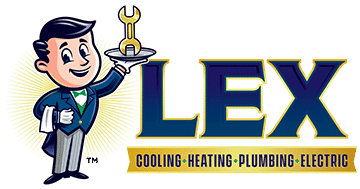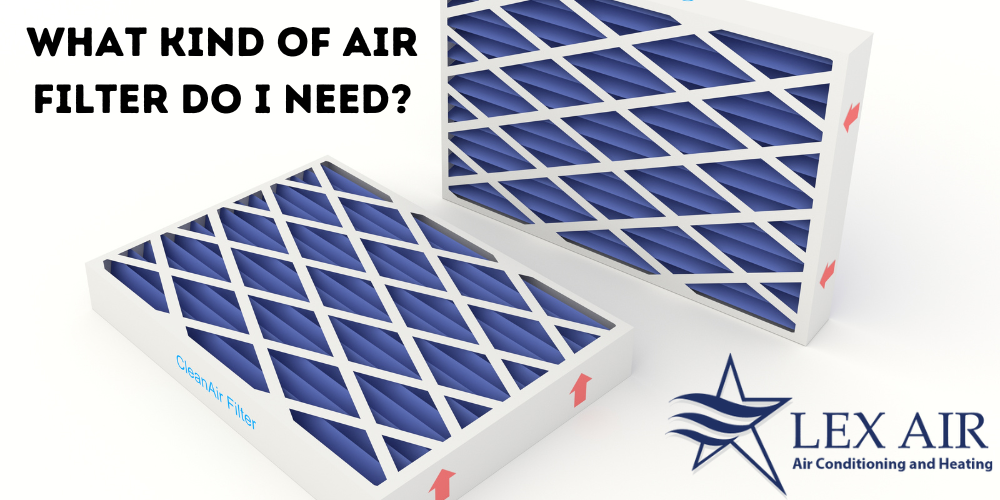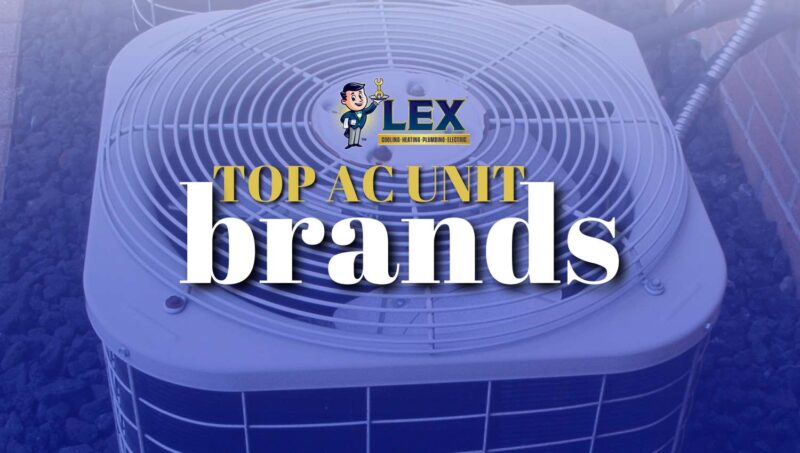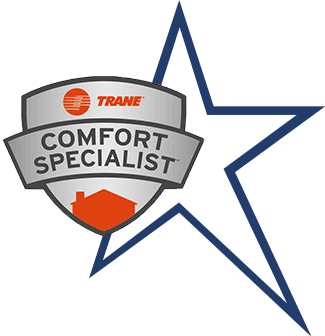Choosing the right air filter based on your needs is vital, as not all filters are built the same. The cost of the filter is something you will also want to consider. Speaking with an HVAC professional before deciding which filter to purchase would be a wise decision.
Making the decision of whether you want reusable filters or disposable filters is also crucial in figuring out the best air filter for your home. Our experienced HVAC technicians at Lex Air Conditioning and Heating have compiled a list of the different air filter types to help you better understand what filter is right for you and your family.
What Are the Different Kinds of Air Filters?
Each air filter type has its own pros and cons, which may vary depending on the needs of your home. There are people that need HVAC system filters to keep the air free of allergens and other pollutants, and others that just want a basic filter to get the job done.
HEPA Filters
High-efficiency particulate air filters can remove many airborne allergens and pollutants, including mold spores and dust. HEPA filters have a MERV rating of around 16 and are able to provide the highest protection for your home. They can even remove the smallest airborne particles, including tobacco and bacteria.
People living with allergies or other respiratory conditions may benefit from HEPA filters the most. These filters require a contractor to adjust them to fit your specific HVAC system. The design of HEPA filters makes them ideal for capturing larger pollutants, such as pet dander and pollen. They are cost-effective and only need to be changed every few years. The biggest pro of these filters is their effectiveness in purifying the air.
UV Filters
UV filters use short-wave ultraviolet light to kill bacteria and viruses. The UV lamps disinfect the air as it passes through the HVAC unit with germicidal radiation. These are excellent for killing microorganisms that could potentially harm your health, like mold spores.
They can transform oxygen into ozone, which is a potential danger of these filters. This can be hazardous to your health. Low amounts of ozone can cause coughing and chest pain, and higher amounts of it can lead to the worsening of respiratory diseases such as asthma.
While they are great at eliminating bacteria and viruses, they’re not as efficient in screening against pollutants like household dust. For this reason, they are often part of larger filtration mechanisms. The UV light is not visible to the human eye, and the lightbulb needs to be replaced typically every year.
These filters can kill tough pollutants, giving you incredible indoor air quality. However, they can be fairly costly to install. They cannot rid the air of the more common pollutants and are ineffective against gasses, fumes, and cigarette smoke.
Fiberglass Filters
Fiberglass filters are some of the most common air filters used. They are made of spun glass that captures large particles of air pollutants from your home. Fiberglass filters are often referred to as disposable filters because they are designed to only last around 30 days before having to be disposed of and replaced.
While they are inexpensive, they have some pretty big disadvantages. Most air filters can last at least 3 months or longer, but fiberglass filters must be changed every 30 days. They also clog up quickly, forcing your air handler to work much harder and use more energy than needed. These air filters are also not designed for effective small particle removal, which makes them a not-so-great choice for those with asthma or allergies.
Spun Glass Filters
Being one of the most common types of HVAC filters, spun glass filters are made from strands of fiberglass that are spun together. Spun glass filters make for one of the best filter types because not only is it cost-effective, but also disposable, and it protects AC units and furnaces from debris.
These filters aren’t known for improving air quality due to their inability to strain very much and only allow some dust and allergens to be trapped. Due to this, spun glass filters are not recommended for those with respiratory problems who need a filter that will improve air quality.
While they are one of the cheapest filters on the market, they have a smaller surface area and are ineffective in filtering smaller pollutants, making them a poor choice for those who live with asthma and other respiratory issues. They also have a greater risk of getting clogged and impacting airflow negatively.
Pleated Filters
Pleated filters have a MERV rating between 5 and 13. Materials used to make up these filters are polyester or cotton folds. They can effectively filter dust and other airborne pollutants but provide low air filtration and are less resistant to airflow. The pleats in these filters increase the filter’s surface area for better filtering. Filters with more pleats will provide better filtering than those with fewer pleats. They can trap problematic allergens such as pet dander and mold spores.
Pleated filters are also available in two options, reusable and disposable, and can help suppress the HVAC fan noise. Unfortunately, they do require your HVAC system to work harder to pull air through the unit, which could result in decreased efficiency of your HVAC system. Pleated filters slightly improve the air quality of your home, making them a reasonably priced option for those concerned about their indoor air quality.
Electrostatic Filters
Electrostatic filters use small cotton and paper fibers to create static that acts as a magnet for dust and other airborne particles. The magnetism is strong enough to keep these particles from spreading through your home, which makes them one of the best options for those needing a filter that can fight allergens.
They are also available as disposable and reusable, which is an added bonus. You can decide to either wash and reuse them or throw them out and get new ones when it comes time to change your filter. Electrostatic filters are some of the most cost-effective filter options on the market, and they are great for improving indoor air quality. This filter can handle the smaller pollutants but struggles to filter larger ones. That said, they are not a great choice for those with respiratory problems.
Washable Filters
Washable air filters are environmentally friendly and a way to save money. The initial price of these air filters for HVAC systems is usually high; however, it should be viewed as an investment that will last you many years. The initial cost is likely all you’ll have to cover since you can simply wash and reuse them over and over instead of buying new filters every few months.
Washable air filters should be maintained well to ensure they work as efficiently as possible. Being one of the main types of air filters, they come with maintenance directions that should be followed. It is vital that the filter be fully dry before putting it back in, as the slightest bit of remaining moisture can lead to mold and mildew developing on the filter and expelling into the air you breathe.
These filters have a low MERV rating, but they are a wonderful long-term investment for those that don’t have a specific preference about their filter type and don’t need any specialty filters.
Media Filters
Media filters can provide more benefits for HVAC systems than standard filters with high MERV ratings. These provide the same level of filtration as a high-MERV filter but with negative consequences or airflow or static pressure. Media filters have a greater surface area, which prevents static pressure while providing better filtration.
These filters are very easy to maintain and are great for filtering bacteria and other tiny airborne pollutants. The dirt that is filtered is sealed into the filter, which prevents it from being expelled back into your home. Media filters are sturdy and cost-effective. They only need to be changed once or twice a year.
Media filters are popular for their low maintenance. They’re also great at filtration due to their increased surface area, and they also trap pollutants instead of sending them back into the air. However, they likely need to be installed by a professional, and they don’t work effectively when it comes to filtering odors.
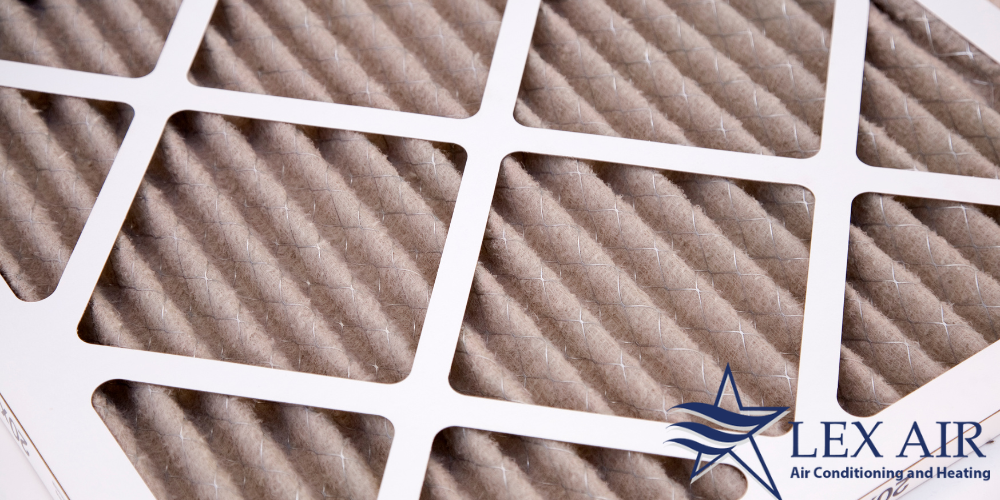
What Is MERV Rating?
Developed by the American Society of Heating and Refrigerating and Air Conditioning Engineers (ASHRAE), MERV is Minimum Efficiency Reporting Value. It is a filter performance rating system with ratings ranging from 1-20, which allows consumers to compare the performance of one filter to another. A higher MERV rating means the filters remove a larger percentage and broader range of debris from the air. The higher the MERV rating, the smaller the particles it can trap.
What Size Filter Do I Need?
HVAC filter sizes are assigned based on the filter’s thickness along with its height and length. While there are standard sizes, the exact filter size will depend on the HVAC system and its specifications. Removing your existing filter and checking the dimensions is the best way to determine what size filter you need. Referring to your HVAC system’s user manual is also a helpful way to determine the appropriate filter size.
Most filters will have a 1-inch thickness for standard systems and a 5-inch thickness for larger HVAC systems. The filter’s size can vary depending on a combination of height and length. Some of the most common filter sizes are:
- 14in by 25in
- 16in by 20in
- 16in by 25in
- 20in by 25in
- 25in by 25in
It’s essential to make sure you have the correct filter size, as no filter is universal.
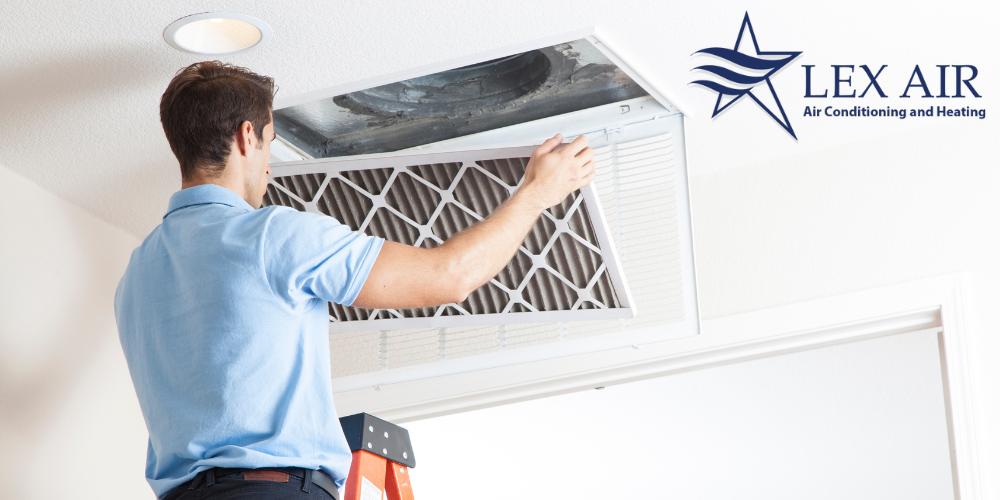
For Help Finding the Most Suitable HVAC Filter For Your Needs, Call Lex Air Conditioning & Heating Today!
At Lex Air Conditioning and Heating, our Carrollton indoor air quality specialists are dedicated to providing the best service to our clients. One of our HVAC service professionals will be happy to help you determine what type of air filter fits your needs. We will also help with the installation of those that require professional installation. If you have any questions or concerns about your air filter, call us at (972) 217-8955 today.
